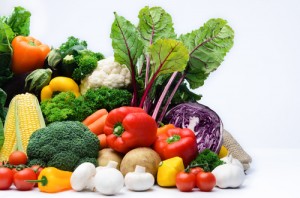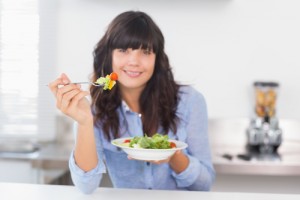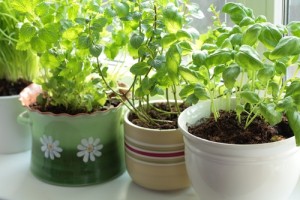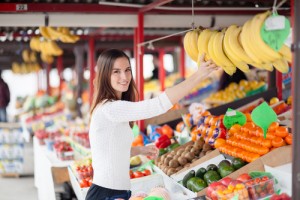It can be tough to give up, or even be confronted about bad habits. It can make us all feel a bit squirrely, can’t it? Food-wise, if often comes down to a reductionist mentality where the one confronted may rattle off something numbers based, like, “This food’s not so bad. Look at what vegetarians/vegans eat. Look at all that fat, all those calories! All those nuts and oils and fake meat! My fast food’s just as good, and it’s cheap enough for anyone to afford.” It’s a biased point of view, and it compares the worst of the vegan foods–not whole grains, fruits, vegetables, and a little healthy fat–to junk foods.
And as I’ll say over and over again, achieving superior health isn’t about adding up a bunch of numbers, or trying that diet by blood type you just heard about. It’s not as simple as that, and there is far more going on with the intricacies in nature to make a natural food nourishing for your body. Sticking to whole foods always wins. Period.
But let’s see what’s up with the noise out there.
The Claims
While the author of an article in The Atlantic did make some good points. It’s true that not everything that vegan restaurants serve qualifies as health food and can be high in fat, and you do need to pay attention to what you’re ordering if you go to one. Things like cashew cheese and vegan butters and mayonnaise products, for instance, will skyrocket the fat content of your meal, raw or processed. But he also doesn’t seem to realize that not all vegan diets are the same when he compares them to junk food. No sir. I do not eat, or advocate eating, any of the aforementioned foods (as I talk about in the Beauty Detox books, I consider cashews a once in a while phenomenon. They can have aflatoxin mold like peanuts, are rarely if ever truly raw, as they have to be steamed out of their shells, and there are far more beneficial nuts out there you can stick to).

He claims it ends with junk food. I know. It sounds ridiculous but first hear the guy out. He believes that junk food will save the world, lessen the obesity crisis, and make people healthier much more effectively than the whole foods movement because it reaches more people, slashes their calorie intake and adds more nutrients without changing the flavors and textures they eat (for example, there are additives that can feel like fat in the mouth but act like fiber in the body). Think about artificial sugars that were meant to cure the world of the negative effects of sugar without asking people to give up sweets…there are serious and dangerous side effects to using them that we weren’t aware of before. Because…THEY. AREN’T. REAL. FOOD. So it begs the question: why would these additives, aka fake foods, be any different?
You Can’t Cobble Together the Perfect Mix of Nutrients for the Best Health
There’s no defending man-made, processed “junk,” whether it’s a hotdog at a stand or a glob of cashew cheese or a seitan-based entity on a dish of refined pasta at an upscale vegan place. Ick. 
Junk food in fancy clothes is never the answer, whether it’s coming from McDonald’s, the convenience store, or one of the vegan restaurants the author of The Atlantic article visited.
Can’t See the Forest for the Trees
Instead of seeing the big picture, people who say junk food is as good for us as certain vegan diets (or that vegan diets are just as bad as junk food) are often looking at the minutia of food—the calories, the fat, the protein, the vitamins and minerals—without considering whether they’re empty calories or what kind of fat’s involved. They also overlook the fact that some balanced vegan/vegetarian diets are low in fat and never recommend large quantities of high-calorie and high-fat foods, especially when there’s a potential for consuming harmful molds along with them, like there is with cashews. They shouldn’t be consumed even remotely regularly.

Some Vegans Eat Junk, Too
I won’t deny that some vegan pre-packaged foods and restaurant meals are junk. Not all diets without animal products are also free of refined carbs, sugars, and excessive fats. They’re processed junk that no one should be eating, and “vegan” or “vegetarian” doesn’t always mean healthy. These foods (foodlike substances) aren’t fair representations of many of the life-changing whole food, raw food, and vegan/vegetarian diets out there, whether they were representative of the choices on the menus or not.
There are decadent (and yes, often expensive!) foods, treats, and “junk foods” for vegans, too, and the author chooses those to make his comparison between the “elite” life and the life of the poor, to demonstrate how McDonald’s is no less healthy than vegan fare. However, with diets like the Beauty Detox, you don’t eat expensive kale chips saturated in cashews or fake chicken-like seitan products, or refined gluten and flour-filled products, and there are lots of easy items to prepare at home (not all of them are time-consuming!) so you’re aware of what you’re eating.
Someone turning to fast food or convenience store pre-packaged snacks for most of their food will devour much more fat (and not healthy fat!) and more calories over the course of a day than a Beauty Detoxer or a vegan who focuses on whole foods, and they wouldn’t save that much money, either.
Healthy Eating on a Budget
The article says it’s difficult to get good produce unless you’re one of the “elite,” implying that you need to be someone who has plenty of money to spend on an exorbitant grocery bill to have a healthy diet. That’s just not true. Here is how to eat healthy on a budget.
Eating less meat will free up money within a grocery budget for more vegetables and fruits and be better for your health.
- You can buy grains in bulk for a much lower price per pound, and they’ll last a while.
- Organic is ideal, but if it’s not available or affordable, that doesn’t mean you should make a beeline back to the fast food restaurant for a greasy cheeseburger. You don’t have to shop at Whole Foods (or Whole Paycheck :) ) to eat well. Scrub your produce, soak it in a vinegar-water mixture, and peel what you can to remove most of the pesticides. Check out bulk stores like Costco, which have some organic produce also.
If you do have access to farmer’s markets, you can save money shopping there. If you can shop at the end of the day when they’re getting ready to pack up, you may be able to score even better deals by negotiating.
- If getting to the grocery store to purchase produce is a challenge, freeze what you can (like fruit), cook what you can ahead of time and freeze that (which makes your dinners almost as convenient as fast food), or make and freeze Glowing Green Smoothies after purchasing the greens so they don’t go bad before you have a chance to use them. You can even buy frozen vegetables if you have to. There is no reason you have to eat junk food on a daily basis. Ever.
- You can grow your own lettuce and celery at home (using the heart and stalk), inside if you don’t have the time, energy, or space to grow even more than that in containers or a garden outside.
- Grow your own fresh herbs in the window.
- If you have neighbors who may be interested in growing their own produce, try working out a system where you grow a few thing and they grow a few different things, then you trade for more variety in your meals without the need for a lot of space. If this suggestion seems to you like its from the times of Little House on the Prairie, I assure you it can make a comeback and it might be a great way to work with your neighbors and get your kids interested in their food and off their iPads more.
Another thing to consider when you try to make the switch to eating more fresh produce and less pre-packaged junk food is this: plan your meals before you shop. If you’re using part of a head of lettuce for a recipe and then have to throw the rest away because you don’t remember to use it or you go buy convenience foods, you’re going to spend a lot of money you don’t have to.
If you plan ahead so that you’ll use up whatever you buy, you may even find yourself spending less per meal (take a look at my Ananda Burrito recipe, for example. It’s $1.67 per serving. That’s less than $10 for lunches to cover a work week.). Even if you can’t find things like nutritional yeast locally, you can add your own fresh ingredients or spices to make it taste delicious.
Should People Be Tricked or Educated?

Do these people who eat junk food all the time need to be “tricked” into eating supposedly healthier foods as some of the information in that article suggests, or do they merely need the education that would allow them to make the best choices available, and understand why they’re making them?
There is one point on which I agree with the author—starting small, with healthier food choices can be a great starting point for people to make permanent, big changes, even if they are not ready for a complete diet overhaul overnight. But people need to realize that they’re making these changes, understand why they’re making them, and know the next step they’re striving for (not seaweed-laden cheeseburgers!). They also need the encouragement to keep going until they feel the benefits of the healthier choices.
The changes made within the fast food industry to cut calories and therefore (hopefully) lower the obesity rates may be a fine place to start, but people eating this way still won’t be healthy; they’ll just (maybe) be smaller.


 Eating less meat will free up money within a grocery budget for more vegetables and fruits and be better for your health.
Eating less meat will free up money within a grocery budget for more vegetables and fruits and be better for your health. If you do have access to farmer’s markets, you can save money shopping there. If you can shop at the end of the day when they’re getting ready to pack up, you may be able to score even better deals by negotiating.
If you do have access to farmer’s markets, you can save money shopping there. If you can shop at the end of the day when they’re getting ready to pack up, you may be able to score even better deals by negotiating.
Great information! This is an entirely separate question, but I recently saw an episode of “Naked and Afraid” on the Discovery channel. What would be the vegan option if you were stuck in the wild for 30 days? These people generally hunt for meat to get their protein and I was trying to figure out protein options for vegans when produce isn’t readily available. Thanks!
this is the most comprehensive and reasonable food advice I’ve stumbled upon recently.
with so many new research facts and studies that come up every month, it’s more important to be informed (or educated) than to follow long-established rules or diet philosophies. I know so many vegans who eat processed food containing palm oil – or vegetarians surviving on veggie junk food…
as always, the truth (and what’s good for us) is really in the balance.
Awesome! Beautifully said and very inspiring ;) Always a pleasure hearing your perspective on these growing issues Kimberly. The article has brought to light some of my own food choices, the vegan ones, and reminded me to be more careful about thinking because I’m a vegan that means I can eat whatever is on the vegan menu. Thank you for striving to keep humans intelligent and healthy!! You’re doing a wonderful job.
I agree with everything said above. Even if healthy foods are a little more expensive, ISN’T IT WORTH IT? Anyone who smokes of drinks booze in large amount should never complain that they can’t afford healthy food. Cut down on the bad habits and make more new healthy habits.
I think you are a little ruff with some of us Kimberly. I just can’t eat scale and salad all the time. It is just too boring for me ! I love you but when I saw your fridge, I was scared :-) Me, I love seitan as a easy way to have a complete meal mixed with rice, mushrooms and tomato sauce. Vegetable potatoes are also easy to mix with Quinoa when you just don’t have time to cook at night. I am already proud to get a Green Juicy everyday and lots of carots, cucumbers, strawberries… Like you say, your diet doesn’t have to be 100% perfect. At least, I understood many things thanks to you but I just want to keep my freedom of eating some “not all perfect food” because I just have pleasure to do it.
Amen!
Thank you Kimberly for another great point of view. Our technology driven society we live it has become so blind to what has been right in front of us all along.
NO! Junk food only benefits the food manuafacturers. It s hould be outlawed. I love my whole food way of eating. Your “Beauty Detoxx” system is making me healthy and beautiful. I am getting postivie comments from family, co workers and the bus driver.
Hi Kimberly! What is your opinion on wheatgrass? They sell shots of it fresh from my local market and it seems good, but I would love to know what you think! :)!
Jordan
Dear Kimberly,
For years I have complained about my symptoms to Dr.s and no one ever dug deep enough until now. I finally paid out of pocket and went to a Holistic Dr. After blood tests I have been diagnosed with severe Vit. B deficiency, yeast in my blood and adrenal exhaustion. I just seriously thought I was just becoming stupid from hitting my head in a car accident 20 years ago. I kept complaining of exhaustion, dementia, apathy, misspelling words and a lack of oxygen in my legs as I climbed stairs. So much is happening.
The thing is, I am a vegetarian that eats some fish, but I have been practically held hostage by sugar and refined carbs due to my sluggishness over the years. Is there anything that will banish these cravings? I keep trying to drink The Glowing Green Smoothie and Juice and eating amazing gorgeous and healthy salads, but then all of sudden-BAM! It’s like I am possessed with an alter ego that takes over my body and I become helpless to pizza and tiny little donuts. I feel like my will power is just plain gone! Is there a diet and or supplements that will help replenish Vit B12 and help me to relinquish bad habits without going crazy?
Sincerely,
Cara
Hi Cara! Eat fruit – lots and lots of fruit! (keep your fat intake low) It’s high in carbs which will skyrocket your energy and hopefully banish the cravings for bread and sweets. Load up on the good carbs, stop craving the bad ones. Also, cooked carbs like brown rice, quinoa, potatoes, etc are also good for fighting those cravings! I really enjoy oats too (I like them soaked in almond milk overnight served with frozen blueberries). I also experience cravings for bread, I’m finding these solutions work great!
I can totally relate with the “BAM” feeling!! I would also love to know your input Kimberly!
Thank you so much!
Great article. I first went veggie, then vegan with all of the bad, fake foods and now I’m all whole plant based and mostly raw. Life it good ;) Question for you. I’ve been making your GGS’ for awhile now. By the time I add all of my favorite greens and the fruit to my Vitamix, it usually fills two large mason jars. I know how powerful the Vitamix is, if I save the extra smoothie for the following day, are the enzymes still good?
I personally feed myself (5’5″ vegetarian for 23 years) and my 6’3″ husband, who has only recently begun to transition to a predominantly (meat less than once a month) vegetarian diet, on $75.00 a week. He is a ballpark vendor and climbs stairs most of his work day, so he is a ravenous person, in general, and eats about four times what I do. We are both at a healthy weight. Every day, we each have green smoothies and/or 16 oz. of fresh vegetable juice, a large salad at lunch, and a small salad at dinner. Sometimes we have a large salad with grain or soup at dinner instead, or we supplement the small salad with a veggie-heavy grain dish. I buy organic for everything I possibly can and buy bulk staples of rice, quinoa, millet, and steel-cut oats. I don’t know anyone who can feed two people better for less. I hear all of the time from friends how expensive produce is, but my only explanation for this perception is that they are either basing the cost analysis on a per-calorie cost figure or are comparing eating at a relatively healthy restaurant with eating at a fast-food chain.
Awesome work April – very inspiring. I love buying, preparing and eating organic wholefoods (makes me feel happy and run faster!) but I’m always looking for ways to do it more economically. Any other tips would be gratefully received :-) Thanks and all the best to you.
Darn! I’ve to go to a gathering at my son’s school correct when which is happening.